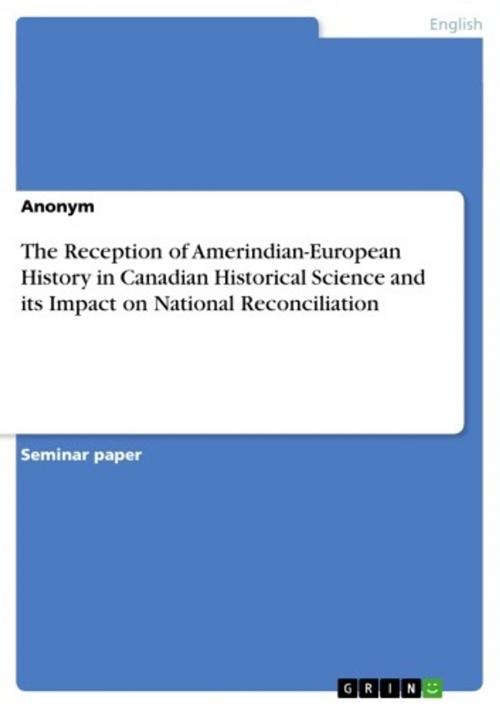The Reception of Amerindian-European History in Canadian Historical Science and its Impact on National Reconciliation
Nonfiction, Entertainment, Drama, Anthologies| Author: | Aonymous | ISBN: | 9783638383271 |
| Publisher: | GRIN Publishing | Publication: | June 2, 2005 |
| Imprint: | GRIN Publishing | Language: | English |
| Author: | Aonymous |
| ISBN: | 9783638383271 |
| Publisher: | GRIN Publishing |
| Publication: | June 2, 2005 |
| Imprint: | GRIN Publishing |
| Language: | English |
Seminar paper from the year 2004 in the subject American Studies - Culture and Applied Geography, grade: 1,0, University of Bremen, language: English, abstract: [...] A hint to answer this important question gives us the literature about historical injustice. The basic assumption of this literature is that unresolved historical injustice often continues to effect the present day and that a process of societal reconciliation must take place in addition to political attempts to remedy social inequalities. This seems to be highly relevant for the situation of the native-majority relations in Canada, because this relation is undoubtedly marked by the historical injustice committed against the Native Peoples. The assumptions put forward in this essay are that the work of social historians is of great importance to prepare the grounds for such reconciliation processes and, moreover, that their work mirrors the ability of a society to confront itself with its own history. This is where historiography comes in: their presentation of the historic facts is the basis of how a society constructs its own history. Without a thorough historical examination of the historical injustice, this injustice will not exist in the minds of the population and therefore cannot even enter the discourse. Historians' work serves as the starting point for a societal awareness which will ideally lead to the reconciliation or even compensation of the historical injustice done to Canada's Native Peoples. From this follows the structure of this essay: I will firstly discuss some theoretical core ideas about historical injustice and shortly present the historical setting for the empirical analysis. The following empirical part encompasses an examination of Canadian historian writings about the Native Peoples. More specifically, I will compare older literature from the late 1960s with more recent literature, from the late 1980s onwards, to examine whether the presentation of native Canadians in historical writing has changed and to discuss the extent to which this literature contributes to reconciliation.
Seminar paper from the year 2004 in the subject American Studies - Culture and Applied Geography, grade: 1,0, University of Bremen, language: English, abstract: [...] A hint to answer this important question gives us the literature about historical injustice. The basic assumption of this literature is that unresolved historical injustice often continues to effect the present day and that a process of societal reconciliation must take place in addition to political attempts to remedy social inequalities. This seems to be highly relevant for the situation of the native-majority relations in Canada, because this relation is undoubtedly marked by the historical injustice committed against the Native Peoples. The assumptions put forward in this essay are that the work of social historians is of great importance to prepare the grounds for such reconciliation processes and, moreover, that their work mirrors the ability of a society to confront itself with its own history. This is where historiography comes in: their presentation of the historic facts is the basis of how a society constructs its own history. Without a thorough historical examination of the historical injustice, this injustice will not exist in the minds of the population and therefore cannot even enter the discourse. Historians' work serves as the starting point for a societal awareness which will ideally lead to the reconciliation or even compensation of the historical injustice done to Canada's Native Peoples. From this follows the structure of this essay: I will firstly discuss some theoretical core ideas about historical injustice and shortly present the historical setting for the empirical analysis. The following empirical part encompasses an examination of Canadian historian writings about the Native Peoples. More specifically, I will compare older literature from the late 1960s with more recent literature, from the late 1980s onwards, to examine whether the presentation of native Canadians in historical writing has changed and to discuss the extent to which this literature contributes to reconciliation.















